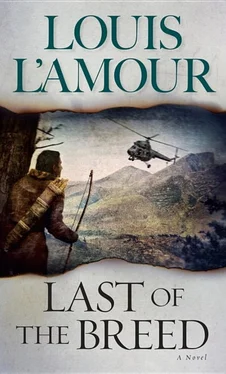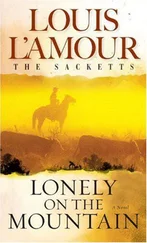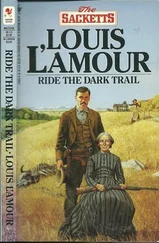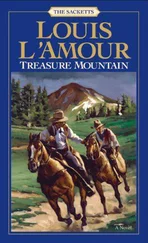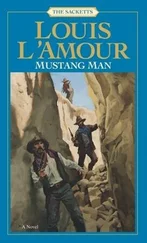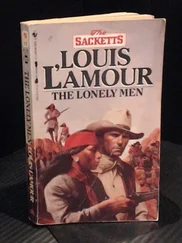Louis L'Amour - Last of the Breed
Здесь есть возможность читать онлайн «Louis L'Amour - Last of the Breed» весь текст электронной книги совершенно бесплатно (целиком полную версию без сокращений). В некоторых случаях можно слушать аудио, скачать через торрент в формате fb2 и присутствует краткое содержание. Город: New York, Год выпуска: 2010, ISBN: 2010, Издательство: Random House Publishing Group, Жанр: Триллер, Историческая проза, Приключения про индейцев, на английском языке. Описание произведения, (предисловие) а так же отзывы посетителей доступны на портале библиотеки ЛибКат.
- Название:Last of the Breed
- Автор:
- Издательство:Random House Publishing Group
- Жанр:
- Год:2010
- Город:New York
- ISBN:978-0-553-89935-1
- Рейтинг книги:3 / 5. Голосов: 1
-
Избранное:Добавить в избранное
- Отзывы:
-
Ваша оценка:
- 60
- 1
- 2
- 3
- 4
- 5
Last of the Breed: краткое содержание, описание и аннотация
Предлагаем к чтению аннотацию, описание, краткое содержание или предисловие (зависит от того, что написал сам автор книги «Last of the Breed»). Если вы не нашли необходимую информацию о книге — напишите в комментариях, мы постараемся отыскать её.
Last of the Breed — читать онлайн бесплатно полную книгу (весь текст) целиком
Ниже представлен текст книги, разбитый по страницам. Система сохранения места последней прочитанной страницы, позволяет с удобством читать онлайн бесплатно книгу «Last of the Breed», без необходимости каждый раз заново искать на чём Вы остановились. Поставьте закладку, и сможете в любой момент перейти на страницу, на которой закончили чтение.
Интервал:
Закладка:
The car was an official car. A Volga was needed for this terrain.
“Talya,” he said, “come here. We must meet them together.”
Chapter 26
Dark were the forests, dark and still. Now it was snowing again, a thick, heavy snow falling steadily, and there was no other sound but that of falling snow, a whisper, faint yet discernible.
Two days ago he had crossed the Maymakan River and hidden himself deep in the forest. He had found a shelter of sorts built by some hunter and trapper, a crude, hidden place, long unoccupied but snug.
Approaching the Maymakan he had heard a sound in the sky, and for a moment he had stopped under a tree. This was a region of scattered trees and occasional meadows, some of them half swamp, and there were islands of mountain riding above the forest. He listened. Not one but several planes were flying over the forest. This was the most intensive search yet, and he dared not move until the planes had flown over; then he trotted out and headed for a thicker grove of trees. Other planes were coming, and he knew the Maymakan River’s banks would be guarded.
He had gone not a half mile when he heard another sound, a sharp command. Close against a tree’s trunk, he watched. Below him, not two hundred yards off, a platoon of soldiers was making camp.
He faded back into the forest and went directly away from them for a half mile. When he heard a helicopter, he went under a spruce and crouched in the snow.
They knew where he was. No such search would be permitted unless they were quite sure they were close upon him; otherwise they would not expend the manpower or the fuel. He waited where he was.
Had they seen his tracks in the snow? The copter had been flying low enough.
No matter. As soon as that platoon had eaten, they would spread out in a skirmish line and come through the woods. Undoubtedly, there were other such groups searching also. To move now would be foolish, yet when darkness came—
He had crossed the Maymakan on the ice and had come immediately into these woods and found this place. The falling snow would wipe out his tracks, and if he remained still he would make no more. It was unlikely anybody knew of this place, and he would remain hidden as long as possible.
Now it was the third day, and the search seemed to be moving away from his area. His hideout was situated on a point of a low mountain with a forest-choked valley on either side, a stream in the bottom of each. There was a small spring nearby, for whoever had made this camp had chosen well. Food was no worry, for he had the last of that stolen from the black-market warehouse at the old mine. He sat tight, hoping they would not find him.
Soldiers being soldiers, he doubted that any would choose to climb the steep mountainside to get to where he was. They could look up, and it would seem empty and harmless enough. More and more, Joe Mack wondered about the man who had constructed this place. Obviously he had not wanted it found, for it had been artfully concealed. On the evening of the fourth day, Joe Mack started again.
The earth was white with snow, except for occasional patches blown clear by the wind. During his period of hiding out, he had made moccasins again for the third time, but this time he had also worked on something else. When he had killed the last elk, he had cut off the hoofs and made moccasins from them. They would not be easy to use, nor could he move rapidly in them; so they were made simply to slip on over whatever he was wearing. A skilled tracker would probably understand what had been done within a very short time, but to the average man the tracks would simply appear to be another set of elk tracks.
He moved out now across a snowfield wearing the elk hoofs. When he reached a bare patch he slipped them off.
It was a slow, careful day, ending on the slope of a mountain looking down upon a road and a power line.
For over an hour he watched the road. There was but little traffic. He was, he guessed, no more than sixty miles from the sea, although that was probably but a poor estimate. It was time he moved back inland, for his area of operation was becoming too limited. Soon he would be seen, and the worst of it was he might not even realize it at the time. There was too much movement here, and the odds were against him.
He waited, listening. Then he moved down the mountain, staying under cover, and watched as a truck went by, and a car. Listening, he heard no sound, and the snow fell thick and fast. Emerging from the brush, he walked across the road, under the power line, and into the brush. The snow was very deep, except on the road itself, where traffic had packed it down.
Moving north away from the highway, he went up through woods so dense he could see no more than a few feet in any direction. At daylight he bedded down in the bitter cold in a snow cave he dug out of the side of a drift, packing the sides with his hands and cutting a snow block for a door. With his bow he pushed a ventilation hole through the snow overhead, leaving the bow in place to help keep the hole open.
Slipping out of his snow cave, he found two branches of the right length and brought them back into the cave, stripping the foliage to leave the bare poles. These he warmed over a fire, taking his time and bending them slightly from time to time. When they were sufficiently thawed, he bent each into an oval and tied the ends. Then with rawhide strips he had saved, he made a webbing and thongs to cover his toe and instep.
For two days he stayed in the snow cave, improving his snowshoes and simply waiting. The search continued, and from time to time he heard planes and once a helicopter, flying very low over the treetops. There had been much snow, and whatever tracks he had made had long since been covered. On the third evening he came out of his cave, collapsed it, and started off through the woods with a swinging stride, wearing his snowshoes.
Avoiding trails, he kept to the mountainsides, alert for any sound, any search parties. The temperature had fallen, and it was piercingly cold. His body had gradually grown somewhat accustomed to it, although he was careful not to work up a sweat and to avoid falls.
He covered something over twenty miles, as nearly as he could judge, and came to another surfaced road. No tire tracks broke the surface of the snow. For a moment he hesitated. To cross the road meant leaving a trail and the snow was not falling so steadily, yet there was no other way. He crossed the road and went up into the trees.
Despite being well covered, with only slits for his eyes, his face was nevertheless stiff with cold. It had been long since he had been warm, and he was running low on food. He would have to make a kill soon. Meat, and especially fat, was essential.
So far, he had been traveling through thick forest and more often than not at night, yet he had made goggles of bark with narrow slits for vision. These he could tie on to prevent the glare that causes snow blindness.
He was plodding into the forest when he turned to look back. He had heard no sound, but a car had stopped and a man had gotten out to study the tracks. The man looked up and looked right at him. Joe Mack stood within the very edge of the woods, but apparently he was visible, for the man lunged for his car. His intentions were obvious, and Joe Mack whipped an arrow from his quiver. As the man turned, he notched his arrow and let fly. The man’s rifle was coming up when the arrow hit him.
He staggered, grasping at his throat, the rifle discharging as it fell into the snow. Joe Mack ran closer and then stopped and bent his bow a second time, for the man was struggling to sit up. The distance was less than twenty yards now, and the arrow went true.
Quickly, he withdrew his arrows, losing the head from one of them but returning the other to his quiver. Inside, the car was warm. There was a pack and, on the seat, a pistol in a holster. There were cartridges also. These he gathered up. There was an emergency kit of food, and that he took. Suddenly, he stopped.
Читать дальшеИнтервал:
Закладка:
Похожие книги на «Last of the Breed»
Представляем Вашему вниманию похожие книги на «Last of the Breed» списком для выбора. Мы отобрали схожую по названию и смыслу литературу в надежде предоставить читателям больше вариантов отыскать новые, интересные, ещё непрочитанные произведения.
Обсуждение, отзывы о книге «Last of the Breed» и просто собственные мнения читателей. Оставьте ваши комментарии, напишите, что Вы думаете о произведении, его смысле или главных героях. Укажите что конкретно понравилось, а что нет, и почему Вы так считаете.
